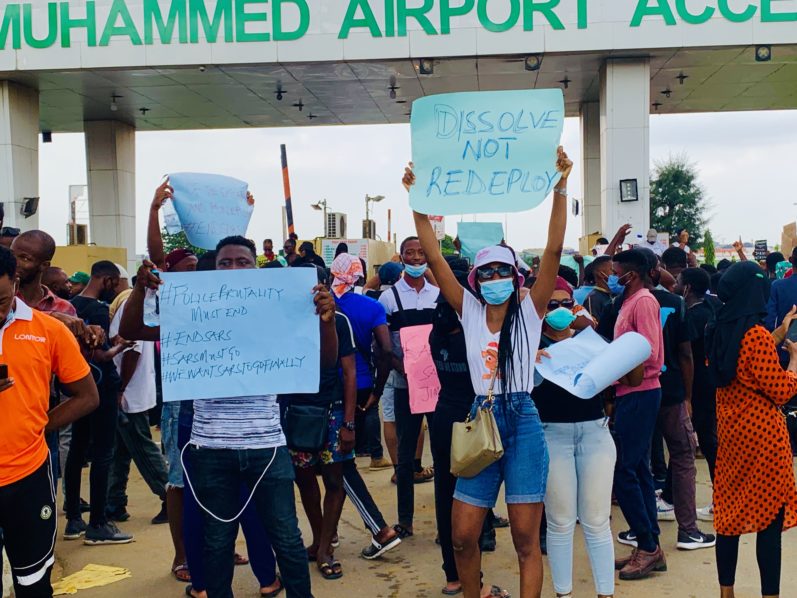
Scores of young Nigerians protesting against police brutality have either been harmed or killed by policemen.
The protests, which began last week, demand an end to a rogue police unit that has been accused of intimidation, extortion, robbery, kidnapping, and extrajudicial killings.
In most cases, well-dressed young people were deliberately targeted by members of the Special Anti-Robbery Squad (SARS) for extortion.
Victims have also been profiled for wearing tattoos and dreadlock and for using expensive phones.
Protests broke in the country last week after years of government paying mere lip service to reform the notorious police unit. The response of the police to the protests have underscored the reasons for the protests.
In Abuja, Nigeria’s capital city, protesters were tear-gassed and were chased with a water canon.
Activist Aisha Yesufu, who was at a protest in Abuja said: “repeatedly shot at me as I walked away from the teargas.” She also accused the policemen of slashing the tyres of her car.
In Ughelli, Delta State, a protester, and a police officer were killed while another policeman sustained life-threatening injuries, police spokesman Hafiz Inuwa said.
In Ogbomoso, 20-year-old Jimoh Isiaq was shot and killed on Saturday by policemen dispersing protesters.
It was unclear if Jimoh Isiaq was among the young Nigerians protesting against police brutality before he was shot. He was rushed to Bowen University Teaching Hospital where he died while receiving treatment.
But pictures shared on Twitter showed him standing by the roadside, many metres away from the policemen. He was unarmed.
Two persons, aged 12 and 15, were hit by stray bullets.
In spite of glaring evidence of Isiaq’s death, the Oyo State police command denied shooting any protester.
More people were shot in the same town when people protesting the death of Isiaq faced with security agents allegedly in the entourage of the minister of youths and sports Sunday Dare, who was in Ogbomoso for “stakeholders meeting” with the leaders of the town.
Eyewitnesses said eight persons were killed. Videos shared on social media showed two bodies being loaded into a police van.
But Dare said the protest was hijacked by “miscreants and thugs who saw a window of opportunity in the protest.”
He said he, Soun of Ogbomoso (the traditional ruler of Ogbomoso), and council chiefs were “scurried into safety by the police and DSS” when the “thugs” invaded the king’s palace.
“Peaceful protests are a legitimate way for citizens to make their grievances known to the government, and it is totally unacceptable for anyone to be hurt during such protests,” Oyo State governor Seyi Makinde said on Monday.
The protests that were largely orderly in Lagos turned bloody on Monday when another unarmed protester was shot and killed in Surulere area of the state by the police. Several others were hit by bullets after police opened fire on protesters.
Many people have been maltreated and arrested for protesting.
“Those that are meant to protect us have been killing, extorting and brutalizing us,” EiE, a good governance advocacy group said.
Although President Muhammadu Buhari said in a video published on social media on Monday that the disbandment of SARS was the first step in a large-scale police reform his government was planning, the shooting and killing of protesters may further fuel protesters to sustain their actions against police brutality.



